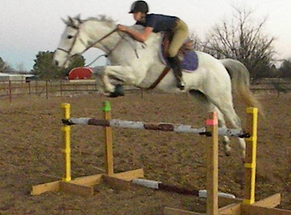
FREQUENTLY ASKED QUESTIONS
Please see below the answers to some commonly asked questions. If you'd like additional information, please reach out to us.
(All photos are ex MSRRR horses thave have been placed)

Where do MSRRR Horses Come From?
MSRRR horses come from all over the country. Some from tracks, some from breeders slimming their operations down or getting out of the racehorse business and some come from trainers needing to make room in their barns for new horses coming in.

Why do racehorses retire from racing?
Racehorses can be retired for a multitude of raeasons. Most often it's because horses start to decline competitively and it's no longer feasible to keep horses in training if they are not helping pay their way. It's also not fair to a horse to continue to race if it's not something they are enjoying or thriving doing. Racehorse training ranges anywhere form $55 to $120 a day so it's not a cheap endevor to have one in training. Often owners are looking to bring in a new horse that will hopefully be more competitive than one they are thinking of retiring. Like any athlete, sometimes they get body sore or have other small ailments that keep them from racing to their full physical potential or simply don't enjoy it any longer.

Are the horses sound?
A good portion of racehorses are very close to sound or serviceably sound. These horses have been athletes and just like any athletes, sometimes they have little things that may require maintenance or management through care, feeding, shoeing or veterinary work. We strive to place horses with suitable riders that will match their future desires and riding ambitions. Because we take most of the horses back to our farm, we can assess them outside of the racetrack environment, ride them, turn them out, mount them from a mounting block, handle them and can accurately provide an assessment of their personalities, what level of rider needed or any vices.

How broke will my new off the track horse be?
Contrary to popular belief, most off track horses are broke enough to walk, trot and canter both ways, picking up both leads. Some may have more 'whoa' than 'go' and some have more 'go' than 'whoa'. The way they ride is dependent on how they are broke and how much time is spent. Most off track horses are broke in a western saddle and moved to 'flat tack' meaning an exersize saddle and race bridle. Most horses have at least 90 days hacking around the farm, round pen work and just being ridden before setting a hoof on the track.

What level of rider is an off-track horse suitable for?
We are often contacted by people who are beginners or have a beginner they are looking to get a horse for. Some off the track horses may work for an advanced beginner under the watch of a trainer. These types are usually laid back, don't care about much and could care less about going anywhere 'fast'(these ones usually don't last long as a racehorse), these are the best ones for someone on a budget IF they are working with someone who can guide them through the slow work and retraining needed as well as getting to know their new horse. Even the horses that are more forward or higher strung, they change after being taken from the track, taken off the vitamins, given a paddock or pasture to stretch their legs in and of course, as much of athletes as they are, they love to work and thrive in a program or just 'doing something'.

Can my horse ride western and not just english?
Yes! We've had many western riders get horses from MSRRR and take and make them ranch horses, ranch versatility, cowboy dressage, trail and mountain horses, even hunting horses. The most amazing thing about off-track horses is their versatility and willingness to work and please their rider.